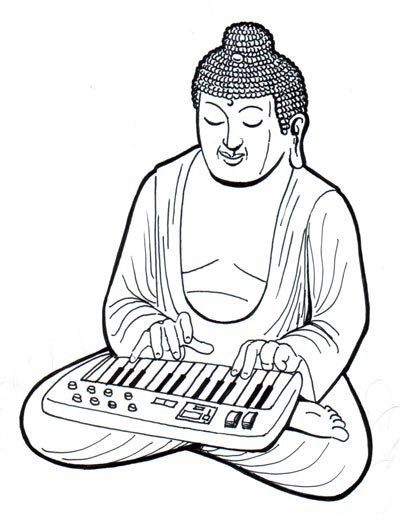“Melodies which run through one’s mind … may give the analyst a clue to the secret life of emotions that every once of us lives … In this inward signing, the voice of an unknown self conveys not only passing moods and impulses, but sometimes a disavowed or denied wish, a longing and a drive we do not like to otherwise admit to ourselves … Whatever secret message it carries, the incidental music accompanying our conscious thinking is never accidental” — Theodor Reik, in “The Haunting Melody: Psychoanalytic Experiences in Life and Music
That intriguing quote reminds me of how my girlfriend back in high school used to keep track of a “song of the week” – each week, she would write down whatever song was most insistent in her mental space. Based on how much fun she seemed to be having with it, I also started keeping track of my own “song of the week”. And I kept doing so long after I moved to California and started going to university at Santa Cruz.
Once I was at that Capital of Consciousness, I began studying and practicing Buddhism, the twelve steps, yoga, tai chi, Jung, Maslow, shamanism, encounter groups, holotropic breathwork – the whole lot. And, as I grew more in self-awareness, I started noticing how my “song of the week”s, whatever song I couldn’t get out of my head, usually had a lot to say about what was really up for me at the time. Just as Freud, Jung, Fritz Perls, and the rest of ‘em would talk about “dream analysis” (what comes up in your dreams tells you a lot about what’s really going on in your life, if you know how to get the message), so I would notice the music I would get obsessed with would do the same for me.
Two real life examples –
“You know, I think that just maybe, honestly, I’m not really as into that woman that I’ve been dating as I have been thinking I have been – that Smashing Pumpkins song that goes, “cool enough to not quite need it …” keeps going through my head all day.”
“Hmmm … I just listened to that “Don’t Leave Me This Way” song for the tenth time in a row. Who is leaving in my life? Anyone? Oh yeah, my favorite housemate – soon. Maybe I feel a loss with them moving out, more than I was thinking I did …”

I am also fascinated by this subject of how listening to certain types of music can shape our mood and our perceptions – our experience of being alive.
In general, I feel that there is something deep and trans-human about music. I notice that musical compositions capture and express movement, journey, and narrative, essential traits of our human mind’s organizing capacity. Buddhism and quantum physics tell me that existence is ultimately a vibration of emergence out of void and disappearance back into void, and the rhythm and beat of music expresses this more immediately than almost any other phenomena I can think of.
I am fascinated by how listening to the rhythm of a beat (especially if played loudly) will cause a human heartbeat to try to match it, thereby exciting or relaxing us, creating a new reality for us, shaping our experience of being alive. This is something that I have been aware of when I have DJed – I know the music that I play will often evoke states of relaxation or excitement for people, depending of how fast the rhythm is.
I am also fascinated by how repetition of a musical figure can cause ecstatic and trance states. Many people I know have experienced this with rave-y, electronic music. A friend of mine also started writing his doctoral dissertation on indigenous cultures who have rituals where they will play the same rhythm/melody for one, three, five, more days straight as a religious/spiritual ecstatic-trance practice.

I am fascinated by how my mood changes in general when I put on music – because of melody and lyrical content as well as because of the rhythm. For example, music in minor keys can often has us feel sad, broken, sexual, dangerous, earthy, etc. and in major keys has us feel bright, godly, upbeat, solid, etc. I wrote a paper in college wondering if tonality is a trans-human phenomena. It turns out that some songbirds sing in what we call the human major and minor scales, also, as well as the lesser known scales (Phrygian, etc).
I am also fascinated by how the music that people listen to not only reflects but cultivates mindstates. I am convinced that the depression that I was in high school was not only reflected in listening to dark, depressed music like The Cure, The Smiths, and The Sisters of Mercy, but that that music helped make the prison walls more solid, by reinforcing a depressed worldview.
I have had discussions with friends where I suggest that many teenagers are solidified in anti-sociability or depression by listening to as much gangsta rap or metal, or depressing gothy/emo music, or whatever. Great art can, of course, have us explore difficult human states of mind from a spacious, aware perspective, and thereby bring a certain clarity and liberation from those difficult situations and emotions. But I also think that we all sometimes overstate that as a motivation to listen to difficult music, and understate the motivation of wallowing in, and having attachment to, our states of aggressiveness, hopelessness, and the like.

Just like people say, “I just read a personal growth book [or had a great therapy session, or whatever], and darned if I’m not seeing the world differently, seeing new possibilities and openings everywhere!”, I wonder to myself what other inputs that we put in our minds (like emotionally unhealthy music) close down those possibilities and openings.


